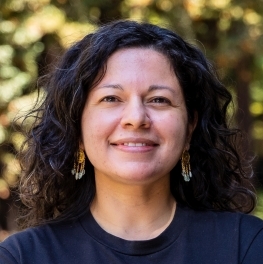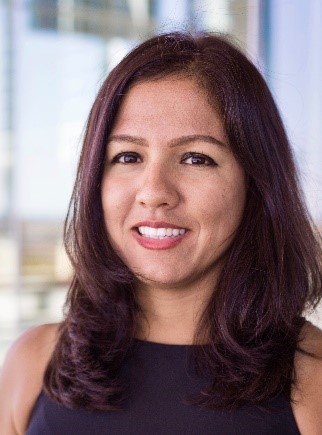One of the greatest assets of the UC Global Health Institute Advisory Council is the diverse multidisciplinary faculty representation across all 10 campuses in the University of California system. Advisory Council members serve as important connections between their campus and the Institute, serving a vital role in carrying out our mission to stimulate, nurture, and promote global health research, education, and collaboration across the UC system and beyond.
This year, we are excited to welcome two new members of the UCGHI Advisory Council, Valerie Cortez, PhD and Dalia Magaña, PhD. Dr. Cortez is an Assistant Professor of molecular, cell, and developmental (MCD) biology at UC Santa Cruz. She came to UCSC in July 2021 not only to start The Cortez Lab, but to serve an important role in the newly established, interdisciplinary Global and Community Health program (which was featured in a previous UCGHI newsletter). Dr. Magaña is an Associate Professor at UC Merced, where her research sits at the intersection of language in Latinx healthcare, language & social justice, and community-engaged scholarship. Their additions to the Advisory Council are an example of UCGHI’s commitment to an interdisciplinary approach to global health as they represent both the biomedical sciences (Dr. Cortez) and social sciences (Dr. Magaña) within global health and work to mentor next generation of global health leaders.
We are excited to highlight these two incredible researchers and teachers as new members to the Advisory Council and get to know their work and their passions. We’re also excited to learn more about these two faculty members and their journeys as we celebrate Hispanic Heritage Month. They are both proud Latine faculty members who are mentoring the next generation of global health professionals. These interviews have been edited for space and clarity.
Valerie Cortez, PhD

Tell us about your journey to get to where you are now.
I started laboratory work in a part-time job as an undergraduate student at Texas A&M and eventually started doing bench work on tissue culture models for cancer. I really enjoyed that and started doing research programs over the summer. After graduating with a degree in biology and a minor in psychology, all I had known was lab work, but I didn't have any real role models, either at my undergraduate institution or from my family, to know what the PhD path was going to be like, so I decided to use my psychology minor after college.
After working as a psychiatric treatment counselor with teenage boys (the hardest job I’ve ever had), I quickly realized that lab-based science was it for me, so I went to grad school at the University of Washington earning a master’s in epidemiology and a PhD in molecular biology combining two interests which started me on my journey in global health working on HIV vaccine research.
After working with the U.S. Navy in Peru, where I surveyed rodent-borne diseases in communities in the southern Peruvian Amazon, and St. Jude Children's Research Hospital for a more ‘traditional’ academic postdoc, I realized that I wanted my own lab, and it was really just a matter of finding the right University. In 2021 I was able to join UCSC where I run a lab and work with the Global and Community Health program.
Tell us about your research.
In my lab, we primarily study viruses that cause diarrhea and the gastrointestinal tract, currently focusing on Astrovirus. Very little is known about them and yet we have all been infected, likely during early childhood. While the infections typically cause mild disease, in some cities across the globe the diarrheal disease can be quite severe in kids under the age of two. We don't know why that is, so we’re looking into what explains that spectrum of disease. Astrovirus is pretty unique in that it does not cause cell death, so we’re focused on understanding that mechanism of disease.
You can read Dr. Cortez’ research on Astroviruses here and here.
How did you get involved with UCGHI and what excites you most about your role on the council?
I came to UCSC as a part of the Global and Community Health undergraduate degree program. My particular role, in addition to running the lab, is teaching principles of epidemiology where I formed a new undergraduate course that's never been taught on campus. It’s been fun to be involved and last year, our campus hosted the UC Global Health Day where I helped with the planning.
Through that role, I was asked to apply for the UCGHI Advisory Council position. It was an important opportunity for me because I’m still learning about the UC system and it’s very cool to meet with so many people across the UCs. I’m excited to learn how these other UCs run their global and community health programs. I also want to be a conduit between the Advisory Council and our campus here and to encourage more UCSC students to be a part of the Student Ambassadors Program.
What passion drives you?
For me it’s training. I’ve thought a lot about what I would like students who train with me to have once they leave my lab, what skills, and their sense of belonging. I’m thinking about how important it is for the students to see these careers as a future for themselves. That involves seeing their own strengths and building up areas where they want to go in their career paths. And the students are really great. They help me think about where there are places in academia that we can enact change. It’s really impactful for me to hear about how they see their future.
Dalia Magaña, PhD

Tell us about your journey to get to where you are now.
My childhood experience actually played a big role in my journey. My mother immigrated from a rural area in Mexico and came here with low literacy levels. She tried to learn English, but never really was able to learn it, so I became her main interpreter as a child.
Those experiences have shaped the kind of work that I do around language barriers, health care, and health communication. I do community-engaged work here in Merced, where about 50% of the population is Latinx. There are many Spanish speakers and many health disparities affecting them specifically. I connect these disparities back to my family life.
Part of my work is talking to people, learning about their experiences and the stories of my students, a lot of it resonates with me and my family. The students in my Latinx health class are amazing. They’ve overcome so many hurdles as predominantly first-generation students. They recognize the need to support immigrant/rural communities who are the most vulnerable.
Tell us about your research.
I conducted a study where we interviewed Spanish-speaking people to understand their experiences in a healthcare setting. We found that many felt they were treated differently than English speakers. Receptionists wouldn’t be friendly because they needed additional help filling out paperwork, they also felt like doctors were frustrated with them, and consultations were rushed. Instead of perceiving healthcare workers as allies, they view them as opponents.
I also study metaphors and the language used around healthcare and cultural values. One of our collaborations is with a nonprofit organization in Merced, Healthy House. We’re studying the stories of breast cancer survivors to learn how Latinas use language and how that can help us train providers to speak to people in ways they understand and recognize how they view illnesses. Unlike the language of violence and opposition (e.g., “my battle with cancer”) many use around cancer, the women in our study use journey metaphors (e.g., “my path with cancer” and “God is walking me through this”). It’s also about family, experiencing an illness collectively rather than in isolation, which reflects the cultural value of familismo. Recognizing the people who helped them along the cancer journey as well as spirituality.
All of this work informs how providers and organizations can engage with Latinx patients in a culturally-informed healthcare setting.
Dr. Magaña published the book, Building Confianza: Empowering Latino/a Patients Through Transcultural Interactions in 2021 on her findings.
How did you get involved with UCGHI and what excites you most about your role on the council?
I was elected to serve on the [Advisory] Council, but even though I was on sabbatical, I said “yes” because it sounded like an amazing opportunity to raise awareness about what’s going on in Merced and the Central Valley. It’s an underserved marginalized population area and I’m excited about raising awareness of the stories here and what's happening here.
I’m excited to learn more about what others are doing at other UCs and the issues there. Everyone on the board is committed to health and justice for all and I’m excited to get to know them.
What passion drives you?
My passion is studying language, how people view their health issues, and understanding the challenges they face in healthcare. I’m interested in making sure that this knowledge gets disseminated a bit more broadly so that people are not misjudged or misunderstood. I still go through this with my mom, who mostly speaks Spanish. She recently had a stroke, and even though she lost much of her mobility, her memory and speech were only minimally affected. However, a healthcare worker who spoke English to my mom labeled her as speech impaired because my mom did not answer her questions. I want people to know that these things still happen. My passion is to do my part to make sure people are treated better, they’re understood better, and have equal access to health.
UCGHI looks forward to our partnership with Drs. Cortez and Magaña, working with them on strategic planning and UC Global Health Day 2024, “Making Change: Creating Health Equity Through Policy and Advocacy.” Registration for UCGHD 2024 is open now!
